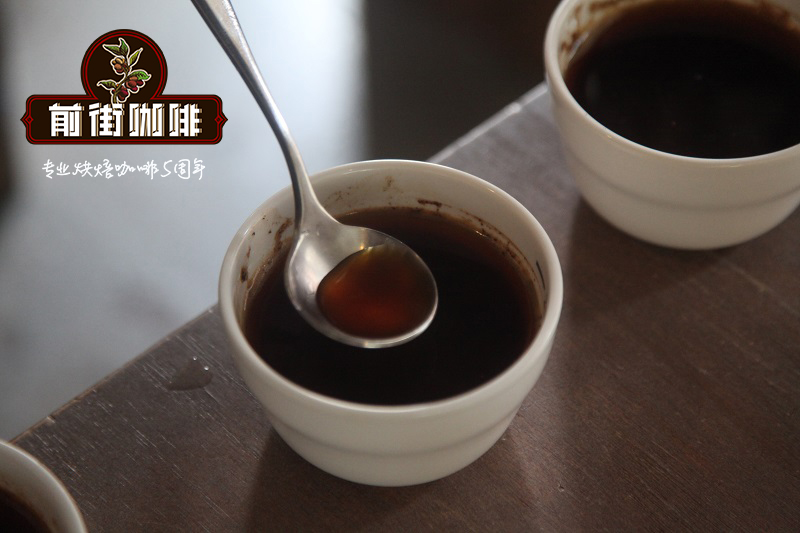The relationship between Yunnan small Coffee and Katim Coffee beans Why does Catimor Katim's hand flush taste bad?

Professional coffee knowledge exchange More coffee bean information Please pay attention to coffee workshop (Weixin Official Accounts cafe_style)
Coffea arabica L. The medium-grain species is Coffea canephora, and the large-grain species is Coffea liberica family: Rubiaceae Coffee [alias] Small grain species are also called Arabian species, medium-grain species are also called Ganfula species, and large-grain species are also called Liberian species. There are two common species: Arabica and Robosta. Coffee is rich in protein, fat, sucrose and starch, caffeine and other substances, made of beverage aroma rich, delicious taste, rich nutrition, thus becoming the world's three major drinks and tea, cocoa composition, and ranked first. Yunnan coffee is a variation of Arabic original species, after long-term cultivation and domestication, generally known as Yunnan Arabica coffee, has been cultivated for more than 100 years. Configuration characteristic: Small arbor or big bush, plant height 5--8 meters. Base usually much branched, older branches gray. nodes dilated, young branches glabrous. Leaves thin leathery ovate-lanceolate or lanceolate, apex long acuminate, base cuneate or slightly obtuse, entire or shallowly undulate, glabrous on both sides. Cymes several clustered in leaf axils, corolla white, aromatic. Berries are broadly elliptic when ripe, red, 1.2- 1.6 cm long, seeds 0.8- 1.0 cm long. The flowers bloom from March to April. Origin and Distribution: Originated in Ethiopia or Arabian Peninsula. Fujian, Taiwan, Guangdong, Hainan, Guangxi, Sichuan, Guizhou and Yunnan have cultivation. Yunnan Arabica coffee sweet taste, taste excellent, it is worth taking home to taste. Lijiang ancient city Xinhua Street entrance and Shuhe ancient town Jiuding Longtan each have a branch, especially Shuhe shop good service, good atmosphere. Thanks to the owner of Lotus Inn Hui Hui, you can enjoy a discount of 12% at Gucheng Store and bring two pounds of coffee beans back to Taipei in one breath. Strolling to the Shuhe shop, in addition to tasting coffee, he bought a set of handmade coffee making tools and brought half a pound of coffee to Maggie's house.
Catimor in Yunnan-According to Coffee research, Catimor is a hybrid of Timor (which is resistant to mottle) and Caturra. The main characteristics are an earlier harvest and higher yields than other arabica species for the same planting area. Catimor is criticized for "not having as good a taste as other arabica species," especially at altitudes above 1000 meters. Dr E. Illy once said: Don't plant Catimor, because it has 25% of the Robusta gene, so it can resist mottle but it also brings bad flavor... Costa Rica and Colombia have had tragic results from planting Catimor. However, Thailand is said to have cultivated a good taste of Catimor species. In 2003, I received SCAA data, which introduced the general situation of Yunnan production area, and it was indeed pointed out that Catimor species were mainly planted in this area.
Yunnan coffee is a variant of Arabic original species, after long-term cultivation and domestication, generally known as Yunnan Arabica coffee, has a cultivation history of more than 100 years. Yunnan coffee is mostly planted in the dry hot river valley area at an altitude of 1100 meters, so the sour taste is moderate, the flavor is rich and mellow. As far as climatic conditions are concerned, the long sunshine time in southern Yunnan is conducive to the growth and photosynthesis of plants, and the large temperature difference between day and night and the low temperature at night are conducive to the accumulation of coffee nutrients. Therefore, the effective nutrients contained in Yunnan Arabica coffee are higher than those of other coffee varieties abroad. Due to the excellent quality of Yunnan coffee, it entered the London market in the 1960s with "Lujiang No.1" and was rated as a first-class product. Yunnan Arabica coffee due to unique geographical environment and climatic conditions, formed a strong but not bitter, fragrant but not strong, with a little fruity unique flavor, world-class coffee experts evaluation is the best coffee in the world, its cultivation technology, yield is also world-class. In recent years, the world's famous Nestle, Maxwell, Starbucks and other international giants have come to Yunnan to open up raw material bases, Yunnan products have gradually become famous at home and abroad. "I've seen countless coffee plantations around the world," said Steisos, a chief coffee expert at the United Nations Development Programme, after visiting the Lujiang farm."The management here is world-class and the yield is the highest." Commercial cultivation of Yunnan coffee dates back to 1985, but on a limited scale. In 1995, the government of Yunnan Province formally put coffee cultivation into "18 biological engineering", coffee cultivation has been rapidly developed. In 1998, the Opinions of the People's Government of Yunnan Province on Accelerating the Development of Coffee Industry was issued, and the coffee industry finally ushered in an opportunity for development. However, due to the limited technical level, Yunnan coffee has been in the stage of raw material supply for many years. Yunnan coffee is famous, but most of the profits are taken away by foreign coffee giants. As early as the 1980s, Yunnan Arabica attracted Nestle to establish coffee farms in Pu 'er. In 1997, Yunnan was able to supply all the Arabica coffee raw materials needed by Nestle, and there was no need to import them from abroad. Yunnan has become a world-renowned high-quality coffee bean production base and attracts many coffee buyers to purchase coffee beans. Yunnan's coffee beans have been supplied to five major coffee giants in the world-Nestle, Max, Kraft Foods of the United States, Newman of Germany and Ikam of Denmark. At present, Yunnan Arabica coffee planting area of 490,000 mu, output of more than 42,000 tons, has become China's largest coffee-producing areas. Yunnan's 12th Five-Year Plan proposes to increase coffee planting area to 1 million mu and output to 100,000 tons. Yunnan is responsible for 98% of China's coffee cultivation and export. In recent years, Yunnan Coffee has devoted itself to the development from raw material supply to deep processing. Not only does Yunnan Coffee build its own instant coffee production line, but its own Chinese-made coffee brand-Hougu Coffee has also begun to be favored by consumers in the market. At present, there are only four coffee processing plants in China: Hougu, Lishen, Nestle and Maxwell. Nestle's production line in Guangzhou has 2000 tons, Maxwell 1000 tons, Hainan's Lishen is almost negligible, and the total annual production capacity is less than 700 tons. In the past two years, Yunnan Hougu Coffee Co., Ltd. has become the largest instant powder producer in China with a production capacity of more than 13000 tons.
The year 2010 was a happy year for Yunnan spice growers. The purchase price of various spices generally rose, and the increase rate was not small. The cause and effect of this good news is that the area planted with spices in Yunnan has shrunk sharply under the lure of cash crops such as tea, coffee and fruits... Yanbao does not know that Yunnan is also entangled in its Arabica coffee. Yunnan local media reported that: Yunnan coffee has been a lingering haze, as a new role in the international coffee market, Yunnan coffee has not enjoyed a reasonable return of "a penny for a good price", the reasons come from many aspects. However, I feel that I am still repeating the mistakes of the spice industry, similar to extensive processing and no precision work, similar to encountering technical barriers from resource importers or completely losing bargaining power, similar to disorderly competition and price wars in the industry... In the market ecological chain, Yunnan products are at the most initial link. Logically speaking, such an unfavorable position especially requires solving the channel problem. The purpose of small profits should be to increase turnover. However, the reality is that Yunnan coffee in the "well-received but not sold at a good price" old hate, but also added "insufficient production" this new worry. It is said that the annual global demand for coffee is about 130 million bags (60 kg/bag), while Yunnan coffee production is only about 25,000 - 30,000 tons. There was no need to worry about selling them. They couldn't sell them at a high price. In the end, they weren't enough to sell them…In fact, Yunnan spices were also destined for this fate.
Important Notice :
前街咖啡 FrontStreet Coffee has moved to new addredd:
FrontStreet Coffee Address: 315,Donghua East Road,GuangZhou
Tel:020 38364473
- Prev

Is Katim Catimor Robusta or arabica coffee? Which species does Katim belong to?
Professional coffee knowledge exchange more coffee bean information please follow the coffee workshop (Wechat official account cafe_style) this coffee is Colombia National Coffee Research Center (Cenicaf) released in 2005 a new hybrid with Robusta gene is Robusta! Orz (do not know what is Robusta? Anyway, it's caffeine.
- Next

Catimorkatimo Coffee History Katim English Catimor Coffee Features
Professional coffee knowledge exchange more coffee bean information please follow the coffee workshop (Wechat official account cafe_style) 1, coffee transmission route outline Ethiopia to Yemen (595850), Yemen to India and Java (1600), Java to the Netherlands (1706), the Netherlands to Paris (1714), Paris to Bourbon (1718) Martinique Island, Haiti (1723)
Related
- Detailed explanation of Jadeite planting Land in Panamanian Jadeite Manor introduction to the grading system of Jadeite competitive bidding, Red bid, Green bid and Rose Summer
- Story of Coffee planting in Brenka region of Costa Rica Stonehenge Manor anaerobic heavy honey treatment of flavor mouth
- What's on the barrel of Blue Mountain Coffee beans?
- Can American coffee also pull flowers? How to use hot American style to pull out a good-looking pattern?
- Can you make a cold extract with coffee beans? What is the right proportion for cold-extracted coffee formula?
- Indonesian PWN Gold Mandrine Coffee Origin Features Flavor How to Chong? Mandolin coffee is American.
- A brief introduction to the flavor characteristics of Brazilian yellow bourbon coffee beans
- What is the effect of different water quality on the flavor of cold-extracted coffee? What kind of water is best for brewing coffee?
- Why do you think of Rose Summer whenever you mention Panamanian coffee?
- Introduction to the characteristics of authentic blue mountain coffee bean producing areas? What is the CIB Coffee Authority in Jamaica?

